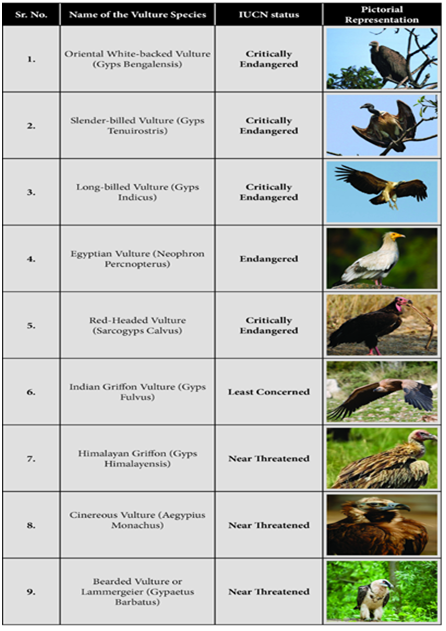

Context
According to a New UK study, decline in Vulture population is one the key issues seen by all around the world. This issue has been addressed by many countries via conservation efforts, however still there is a need to improve the vulture tracking measures.
About
Vultures in India:
- Vultures are scavenging birds of prey. They are nature's most efficient scavengers.
- India shelters about nine speciesof vultures, but most of them face the danger of extinction.

Why vultures matter?
- Vultures feeding on dead animals help areas getting rid of carcasses that, otherwise, would provide foul smells and scenery for a much longer period hence also known as nature’s cleanup crew.
- Vultures also play a valuable role in keeping wildlife diseases in check.
Causes of decline:
|
Diclofenac is a veterinary non-steroidal anti-inflammatory drug (NSAID), which is used to treat pain and inflammatory diseases such as gout in carcasses that vultures would feed off. |
- Uncontrolled veterinary usage of non-steroidal anti-inflammatory drugs (NSAID), including Aceclofenac, Ketoprofen and Nimesulide.
- Illegal use of the banned drug Diclofenac, are toxic to vultures if they feed on carcasses within 72 hours of the drugs' administration to such livestock.
Important Government Initiatives:
- Vulture Conservation 2020-2025: A Vulture Care Centre (VCC) was set up at Pinjore, Haryana in 2001 to study the cause of deaths of vultures in India.
- TheJatayu Conservation Breeding Centre in Pinjore is the world’s largest facility within the state’s BirShikargah Wildlife Sanctuary for the breeding and conservation of Indian vulture species.
- SAVE (Saving Asia’s Vultures from Extinction):The consortium of like-minded, regional and international organizations, created to oversee and coordinate conservation, campaigning and fundraising activities to help the plight of south Asia’s vultures.
- Objective: To save three critically important species from extinction through a single programme.
- SAVE partners: Bombay Natural History Society, Bird Conservation Nepal, RSPB (UK), National Trust for Nature Conservation (Nepal), International Centre for Birds of Prey (UK) and Zoological Society of London.
- Ramadevarabetta Vulture Sanctuary: The vulture sanctuary was officially set up in 2012, but the long-billed, Egyptian and white-backed vultures have been roosting in the hills of Ramanagara for several decades. These are the three species found in Ramanagara out of the nine found in India.



